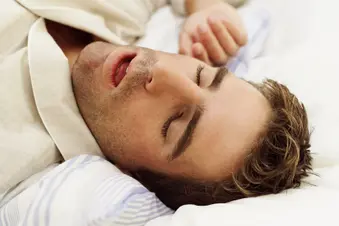Are You at Risk for Sleep Apnea? Test Your Knowledge.
Medically Reviewed by Jennifer Robinson, MD on August 24, 2022

Question 1/13
If you snore, it means you have sleep apnea.
- True
- False
Question 2/13
If you don't treat it, sleep apnea can raise your risk of:
- Stroke
- Depression
- Car accidents
Question 3/13
Which activity may reduce daytime sleepiness caused by sleep apnea?
- Yodeling
- Tonsil flexes
- Playing the didgeridoo
- Flossing daily
Question 4/13
Sleep apnea is more common in people who are overweight. Why?
- Extra weight can cause sleep apnea.
- Sleep apnea may cause weight gain.
- Neither
Question 5/13
The most common treatment for sleep apnea is a CPAP – continuous positive airway pressure – machine. How does it work?
- Adjusts the angle of the spine during sleep
- Uses electrical impulses to induce REM sleep
- Blows air to keep the airways open during sleep
- All of the above
Question 6/13
The older you are, the more likely you are to have sleep apnea.
- True
- False
Question 7/13
When CPAP doesn't work to reduce symptoms, what's the No. 1 reason why?
- Another health condition gets worse
- The machine stops working
- People stop using it
- Breakthrough snoring
Question 8/13
Which of these may help treat sleep apnea?
- Surgery
- Weight loss
- All of the above
Question 9/13
How is sleep apnea diagnosed?
- Blood test
- Overnight sleep study
- Physical examination
- EKG
Question 10/13
You may be able to reduce mild sleep apnea symptoms by propping up the head of your bed.
- True
- False
Question 11/13
How can you make using a CPAP easier?
- Get used to it by wearing the mask briefly during the day
- Just use it on nights when you wake up
- Only sleep on your back so the mask won't move
- All of the above
Question 12/13
Which of these can make sleep apnea worse?
- Sleeping pills
- Alcohol
- Tobacco
- All of the above
Question 13/13
Who's usually the first to notice signs of sleep apnea?
- The person who has it
- Doctor
- Sleep specialist
- Bed partner